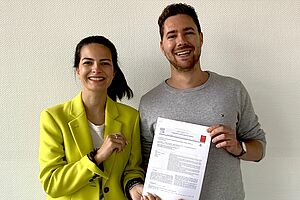Using an application that is part of living brain's first product, "teora mind," the team investigated whether VR training would be accepted by stroke patients. The results have now been published in Computers in Human Behavior: Reports.
The most important results in brief:
- Patients after stroke and healthy older adults are equally positive about VR.
- VR is accepted by stroke patients, even cybersickness did not affect its use in this sensitive patient group.
"The results of our study point to the immense potential of VR in neurorehabilitation," say psychologists Julian Specht and Barbara Stegmann, who co-founded living brain in 2019. "This study won't be our last to learn even more about the effects of VR applications for people with brain disorders."
Click here for the original publication:
Specht J. et al. Acceptance of immersive head-mounted display virtual reality in stroke patients. Computers in Human Behavior Reports 2021; 4:100141. https://doi.org/10.1016/j.chbr.2021.100141
